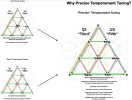Vio
Experienced
Found recently the "Precise Temperament" by Robert Edward Grant.
Bad thing is it works "precise" on 432 and not 440...
Good thing is intervals are precise mathematically speaking compared to just/equal ones.
Playability would probably be better than TrueTemperament since the deviation of the squiggly frets are not as large as in TT.
What are your thoughts on this?
 vs
vs 
Piano tuned in Precise temperament
Bad thing is it works "precise" on 432 and not 440...
Good thing is intervals are precise mathematically speaking compared to just/equal ones.
Playability would probably be better than TrueTemperament since the deviation of the squiggly frets are not as large as in TT.
What are your thoughts on this?
 vs
vs 
Piano tuned in Precise temperament



